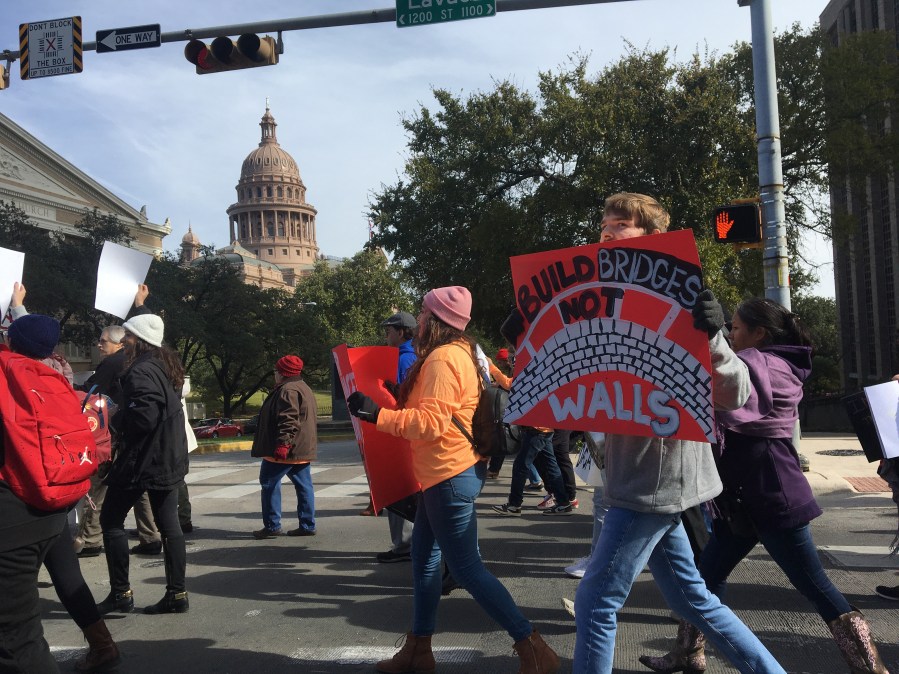AUSTIN (Nexstar) — Diego Corzo has found his version of the American Dream. At 29, he’s a realtor, a real estate investor, and owns 10 properties in the Austin area. He has worked at one of the largest automotive companies in the nation and has a college degree.
He’s worried his path to success could be changed by the Supreme Court, should the Deferred Action for Childhood Arrivals (DACA) program end.
Corzo was born in Lima, Peru, and immigrated to the United States with his parents when he was nine.
“We came here with a Visa but then we over stayed it and that’s when we became undocumented immigrants,” Corzo said. “I had no idea what it would really mean for me.”
The high court hears arguments Tuesday that threaten the legal status of some 800,000 young immigrants, often referred to as DREAMers, who were brought to the United States illegally as children.

President Donald Trump has tried since early in his presidency to rescind the program, which was implemented by his predecessor Barack Obama. Lower courts have blocked Trump’s efforts.
Corzo is part of a group of DREAMers who traveled to Washington, D.C. to share his story. He calls the DACA program “life changing.”
“The DACA program has provided us with a lot of different opportunities so that we can continue to be an asset to the country,” Corzo said.
“We are in limbo because we don’t know what is going to happen with the rest of our lives with the decision that the Supreme Court is going to make,” he explained.
Texas state officials have led repeal efforts of the merit-based program, which grants protections for certain immigrants who came as children.
“This case is about the rule of law. Congress has the sole authority to write immigration laws, and it has repeatedly rejected attempts to enact the polices embodied in DACA and DAPA; however, in a lawless exercise of executive power, the Obama administration attempted to bypass our elected representatives and put those policies in place by executive action,” Texas Attorney General Ken Paxton said in a statement Tuesday.
“The president’s duty is to ensure that the law is faithfully executed, not to re-write laws with which he disagrees. We hope the Supreme Court will recognize the necessity of the Trump administration’s decision to rescind this unlawful program,” Paxton continued.
In 2017, Texas lawmakers banned “sanctuary cities,” allowing local law enforcement officers to question immigration status of people they detain o arrest. Senate Bill 4 punishes local government agencies who do not cooperate with federal immigration detainers.
That action has faced a myriad of lawsuits currently weaving through federal courts.
Paxton argues DACA puts “undue financial strain” on states.
“Texas alone incurs more than $250,000,000 in total direct costs from DACA recipients each year,” according to information his office published in August.
Corzo owns a real estate team which sells about $20 million in real estate, amounting to 60-85 homes each year.
“As a DACA recipient I’m providing jobs for Americans and also contributing and paying taxes and all that stuff,” he said.
His message to the High Court is simple, he said.
“I hope that they see us more as an asset to this country than a threat,” Corzo said.
Maribal Rosas participated in a rally and march at Paxton’s office near the Texas Capitol on Tuesday. She came from Mexico two decades ago and is now working as a bank teller. She bought a house earlier this year.
“The only opportunities we want is for a better future for us and for children,” Rosas, a mother of three, said.
“No matter what the court says – no matter what Trump says – no matter what Governor (Greg) Abbott says – whatever Ken Paxton says – we’re going to continue to push for immigrants rights,” Rosas said.
A month after the announcement that the Trump Administration planned to end DACA, then-U.S. Attorney General Jeff Sessions came to Austin to speak with law enforcement leaders.
“DACA encouraged potentially tens of thousands of vulnerable children to make the dangerous journey North. That had terrible humanitarian consequences—and Texans know that firsthand,” he said.
“One of the things to that urged me to share my story was what (then-U.S. Attorney General) Jeff Sessions said when they terminated the program,”Corzo said.
Corzo is referring to when Sessions said the program “denied jobs to hundreds of thousands of Americans by allowing those same jobs to go to illegal aliens.”
“That is totally not true,” Corzo argued, “because the nonprofits, the small businesses and even (General Motors) hired me because of the potential that they saw in me, not because I was stealing jobs from Americans.”
As a property owner, Corzo worries his tenants would also be put in peril should he lose his legal immigration status and be deported.
“If I can’t contribute to my business or continue to expand it, my employees are not going to have a job,” he said.
“If I lose those homes… what am I going to do with the people that are living there?” he said. “I also contribute to the economy by being a homeowner and providing housing to Americans.”
“There are so many different factors that would come by terminating a program and potentially getting deported because it doesn’t just affect us but also a lot of different people that are Americans,” he explained.
“Our dreams are bigger than our lack of papers,” Corzo said. “We are here hungry to pursue the American dream, and that is what I feel is sharing our stories in Washington, D.C. is all about.”
The Court is expected to make its ruling in the summer. Supporters and opponents of DACA say regardless of what happens in court, Congress should act to find a more permanent solution to the temporary protections the program provides.
















